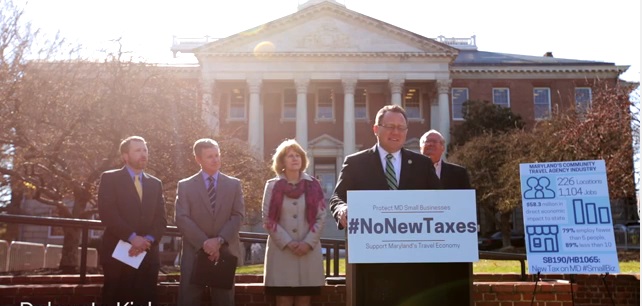Photo above: House Minority Leader Nic Kipke speaks at an April 1 news conference opposing the online travel site tax.
By Len Lazarick
The effort to collect more Maryland sales tax from travel websites such as Orbitz and Expedia moved closer to enactment as the House gave preliminary approval to legislation backed by Marriott International and hotel chains.
The online sites call the measure a new tax and the hotels say it is an existing tax the tech travel sites were pocketing instead of paying. Local travel agents say they may be caught in the crossfire, and wind up paying tax on their service fees.
The delegates defeated efforts to specifically exempt fees charged by Maryland-based brick-and-mortar travel agents on largely party line votes. The bills are HB1065 and SB190, which passed the Senate March 24.
 “I don’t think it’s your intent to charge sales tax on a fee,” said House Minority Whip Kathy Szeliga, whose district includes a large Harford County travel agency.
“I don’t think it’s your intent to charge sales tax on a fee,” said House Minority Whip Kathy Szeliga, whose district includes a large Harford County travel agency.
With all the online competition, local travel agencies, who still employ over 1,000 people, are “having a tough time. These businesses are struggling today.”
But Del. Jay Walker, floor leader for the legislation and a Prince George’s County Democrat, said the local travel agents were already exempted by an amendment excluding any commissions.
The travel agents have said they only get commissions from hotels half the time, and must charge fees for hotel bookings to remain profitable.
Szeliga’s amendment to exempt fees by travel agents were rejected, as were other amendments to spell out the fees on travel bills.
How it works
Under undisclosed agreements between hotels and the online sites, the hotels and the websites charge consumers the same price for the hotel room, including the state sales tax. But the online sites only pay the hotels a negotiated discount rate for the rooms, and the sales tax based on that discounted rate. The websites keep the rest of the money.
For example, an online site offers a hotel room for $100 plus $6 in sales tax. It pays the hotel $80 for the room, plus $4.80 sales tax. The site keeps $21.20 from the transaction.
Under the bill, the site would pay $6 in sales tax and keep $20.
The hotels see the online sites as competitors lowering some of their profit margin.
In a lawsuit in Maryland Tax Court, the comptroller is currently trying to collect up to $6 million in back taxes on hotel rooms from Travelocity.
An amendment by Del. Matt Morgan, R-St. Mary’s, to delay the impact of the bill till after that court case is decided was also voted down.
Various opponents of the bills held a news conference at the State House last week, and produced a video where they explain the problems.
“This bill sends the message that Maryland has not changed its taxing ways and is still not open for business,” said Phil Minardi, vice president for communications and public affairs for the
No position by Hogan
Gov. Larry Hogan has not taken a position on the bill, but Republican legislative leaders have made clear they side with opponents and consider it a new tax.
If Hogan and his staff reach the same conclusion, the governor, a loud critic of recent tax increases, will likely veto a bill that takes more money out the pocket of online travel sites and local travel agents, even though it is backed by Marriott, one of the last remaining Fortune 500 companies headquartered in Maryland.
An opponent of the measure, Del. Eric Bromwell, D-Baltimore County, even offered amendments to make Marriott repay some of the incentives it has been given by the state to remain in Maryland. Those amendments failed.




Protectionism and un-competitiveness anyone ?